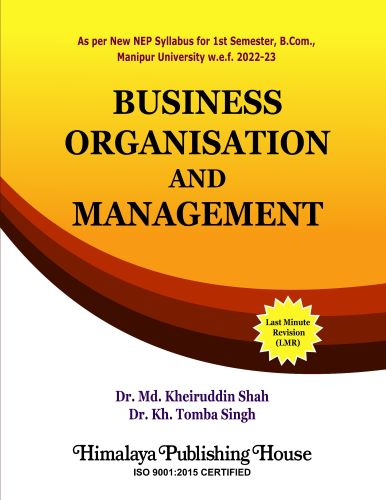We have great pleasure in presenting the first edition “Business Organisation and Management” written for students of UG courses. The subject matter is written in a simple and easily understandable language with sufficient support from real information.
The language of the book is simple and the coverage of various unit is exhaustive with examples. This work is prepared as a basic material for the learners to know fully about Business Organisation and Management. We have tried to make the book very useful for the students but still we will thankfully solicit and incorporate the suggestions of our readers. This title “Business Organisation and Management” provides them an opportunity to develop the skills necessary to meet the challenges.
This is an attempt to provide the students with thorough understanding of Practicals on Business Organisation and Management concepts.
Contents –
1. Concept and Forms of Business Organisations
Introduction, Concepts of Business, Trade, Industry and Commerce, Objectives of Business, Functions of Business, Social Responsibility of a Business, Responsible Business, Ethical Conduct, Human Values, Forms of Business Organisation, Meaning of Sole Proprietorship, Characteristics of Sole Proprietorship, Advantages of Sole Proprietorship, Disadvantages of Sole Proprietorship, Meaning of Partnership, Characteristics of Partnership, Advantages of Partnership, Disadvantages of Partnership, Kinds of Partners, Partnership Deed, Concept of Limited Liability Partnership, Meaning of Hindu Undivided Family, Characteristics of Hindu Undivided Family, Advantages of Hindu Undivided Family, Disadvantages of Hindu Undivided Family, Meaning of Co-operative Organisation, Advantages of Co-operative Organisation, Disadvantages of Co-operative Organisation.
2. Joint Stock Company
Introduction, Joint Stock Company, Meaning of Joint Stock Company, Definition of Joint Stock Company, Characteristics of Joint Stock Company, Advantages of Joint Stock Company, Disadvantages of Joint Stock Company, Code of Business Ethics, Kinds of Companies, Promotion, Stages of Promotion, Promoter, Characteristics, Kinds, Preparation of Important Documents, Memorandum of Association, Clauses, Articles of Association, Contents, Prospectus, Contents, Red herring Prospectus, Statement In Lieu of Prospectus (as per Companies Act, 2013).
3. Principles and Functions of Management
Introduction, Management, Meaning of Management, Characteristics of Management, Fayol’s 14 Principles of Management, Functions of Management, Levels of Management, Skills of Management, Scientific Management, Meaning of Scientific Management, Objectives of Scientific Management, Relevance of Scientific Management, Criticism of Scientific Management.
4. Planning and Organizing
Introduction, Meaning of Plans, Characteristics of Plans, Types of Plans, Advantages of Plans, Disadvantages of Plans, Approaches to Planning, Management by Objectives (MBO), Steps in MBO, Benefits of MBO, Weaknesses of MBO, Organizing, Process of Organizing, Principles of Organisation, Formal and Informal Organisations, Line and Staff Organisations, Line and Staff Conflicts, Functional Organisation, Span of Management, Meaning of Management, Determining Span, Factors Influencing the Span of Supervision.
5. Authority, Coordination, and Control
Introduction, Meaning of Authority, Power of Authority, Responsibility of Authority, Accountability of Authority, Delegation of Authority, Decentralization of Authority, Definition of Coordination, Importance of Coordination, Process of Coordination, Principles of Coordination, Techniques of Effective Coordination, Control, Meaning of Control, Relationship between Planning and Control, Steps in Control, Types (post, current, and pre- control), Requirements for Effective Control.
Last Minute Revision (LMR)







